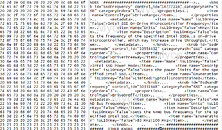Tuesday, August 27th 2013

Intel to Demo SSD Overclocking at IDF 2013
It could soon become possible to overclock the controller and NAND flash of your SSD, if Intel has its way. The company is set to demonstrate how to overclock Intel-branded SSDs using its Xtreme Tuning Utility (XTU), at IDF 2013, which goes underway this September. The item on Intel's IDF itinerary marked "AIOS001" deals with seminars on overclocking Intel's next-generation HEDT (high-end desktop) platforms. X-bit Labs believes Intel could talk about SSD overclocking during that session.
Options to tweak SSDs were discovered when poking around the code of an unreleased XTU version. XTU is a unified software utility by Intel, which lets you tweak CPU, memory, and system cooling on systems running Intel Desktop Boards. Among the things end-users should be able to tweak, apart from the controller clock-speed, are the NAND flash bus-speed. Taking away interface overheads and other round-offs, 560 MB/s appears to be the practical maximum bandwidth SATA 6 Gb/s SSDs have been able to achieve. It could always be handy getting your SSD a few dozen more MB/s sequential speeds at the expense of stability.
Sources:
MyCE, X-bit Labs
Options to tweak SSDs were discovered when poking around the code of an unreleased XTU version. XTU is a unified software utility by Intel, which lets you tweak CPU, memory, and system cooling on systems running Intel Desktop Boards. Among the things end-users should be able to tweak, apart from the controller clock-speed, are the NAND flash bus-speed. Taking away interface overheads and other round-offs, 560 MB/s appears to be the practical maximum bandwidth SATA 6 Gb/s SSDs have been able to achieve. It could always be handy getting your SSD a few dozen more MB/s sequential speeds at the expense of stability.

28 Comments on Intel to Demo SSD Overclocking at IDF 2013
:/
Sounds fun.:pimp:
It's about PCI Express based SSD's. Overclock the PCI Express bus = moar SSD performance.
And i don't think the pci-e will be the bottleneck, as to this day nothing comes close to saturating a pci-e 4x slot! (and don't tell me that 20 ssd in raid 0 can, you'll just prove my point...)
Data is too valuable to screw with.
"It could always be handy getting your SSD a few dozen more MB/s sequential speeds at the expense of stability."
That's an absurd statement. It's not at all "handy" to raise data throughput at the expense of stability. Everything in a PC should always be 100% stable under maximum load. The last thing you should be tweaking to the point of instability is your storage system.
So no, I can think of a number of reasons why I would want an SSD, for reasons other than bandwidth.
On topic: I think that the idea of overclocking non-volatile storage is a terrible and asinine idea. It's not like it becomes volatile if it can't do it, it just doesn't work. Which is terrible for something that is supposed to be reliable and persistent.
oooh, oc pciex bus = revo go quicker , how did that slip my mind, to the bench,, ahoy<jk:p
This one is for any 3.5in hdd.
What could possibly go wrong?
Look how fast I can store useless corrupted data!
Another source for random number generation.